Home |
Contents |
Photos |
News |
Reviews |
Store |
Forum |
ICI |
Educators |
Fans |
Contests |
Help |
FAQ |
Info


Ecological Indian Talk
(8/27/00)
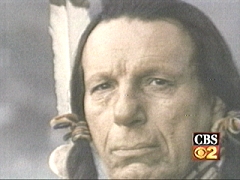
Most of the big shore places were closed now and there were hardly any lights except the shadowy, moving glow of a ferryboat across the Sound. And as the moon rose higher the inessential houses began to melt away until gradually I became aware of the old island here that flowered once for Dutch sailors' eyes -- a fresh, green breast of the new world.
Its vanished trees, the trees that had made way for Gatsby's house, had once pandered in whispers to the last and greatest of all human dreams; for a transitory enchanted moment man must have held his breath in the presence of this continent, compelled into an aesthetic contemplation he neither understood nor desired, face to face for the last time in history with something commensurate to his capacity for wonder.
F. Scott Fitzgerald, The Great Gatsby, Chapter 9
Those descended from European stock, and probably from Asiatic as well, still feel a slight unease, the tiny remnant of the old looking-over-the-shoulder anxiety of the strangers in a strange land.
Bill Reid (Haida), quoted in Bill Reid
*****
Cultural attitudes toward nature
In "Ah, Sweet Nature ... but Only If You Can Afford a Piece of It" (LA Times, 8/18/02), columnist John Balzar describes the essential importance of nature:
It is the nature of nature to inspire us. It's our ancestral home, after all. Our DNA was coded by the rhythms of the natural world long before the advent of cars, air-conditioned office buildings and the 40-hour workweek. In fact, there is plenty of good evidence that the pace and accouterments of modern life are the root cause for so many people feeling adrift nowadays: We have, in fact, departed our element.
The human desire, the need, to reengage nature periodically is one of the essential arguments for conservation in this crowded epoch. The stillness, the solitude, the escape, the renewal that one finds in the natural world is our best, and perhaps final, source of balance.
A key question is whether this feeling is universal across all cultures, especially the progress-oriented Euro-American culture. It's intuitively obvious that indigenous cultures, which lived and still live in close proximity to nature, would cherish it more. But some have questioned whether this truism is in fact true.
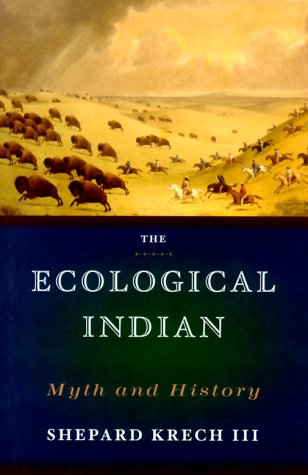
One such skeptic is Shepard Krech, author of The Ecological Indian. Krech tries to paint Native Americans as no better or worse than Euro-Americans, but fails. The best he can do is cast doubt on the eco-warrior stereotype his Anglo brethren created.
Some quotes from Indians
Significantly, Krech somehow manages to avoid quoting Indians about their own beliefs. Here are some quotes he missed on Native and European attitudes toward their environment. They refute his suggestion that Indians had the same values as Europeans and didn't respect or cherish nature.
Note that the earliest views were voiced and recorded before the environmental movement—before it became "politically correct" to portray Indians as eco-warriors. In fact, the eco-warrior stereotype is an exaggeration of Native people's real love for the land and everything on it.
They are in the Sonoran Desert now, but they speak little of it. They do not tell of the giant cactus, they leave us practically nothing in the way of a description of the land. This is normal for such men at such a time. The world as we now see it, one rich with metaphors for nature and keen for the feel of wild land, that world does not exist in the minds of Europeans in the sixteenth century. It has yet to be born. Europe seemed to hate nature. By the time of the Doomsday Book in England in 1086 less than two percent of the virgin forest remained. Nature seemed to be the enemy to the puny humans confronting it. By the sixteenth century Henry VIII of England would have two or three hundred deer rounded up, penned, and then amuse himself by watching his dogs rip them to shreds. And this attitude let to a verbal emptiness when confronting this new world across the water. Gonzalo Fernández de Oviendo, a contemporary of Cabeza de Vaca, in writing his history of the conquests confessed that he could not describe landscapes: "Of all the things I have seen, this is the one which has left me without hope of being able to describe it in words." Nor could Columbus, as any reading of his journals will reveal.
Charles Bowden, The Sonoran Desert, on Alvar Núñez Cabeza de Vaca's trek through the Southwest, 1535-1536
The white man seeks to conquer nature, to bend it to his will and to use it wastefully until it is all gone and then he simply moves on, leaving the waste behind him and looking for new places to take. The whole white race is a monster who is always hungry and what he eats is land.
Chiksika (Kispokotha Shawnee), elder brother of Tecumseh, speaking to Tecumseh, March 19, 1779
The only way to stop this evil is for all the red men to unite in claiming an equal right in the land. That is how it was at first, and should be still, for the land never was divided, but was for the use of everyone. Any tribe could go to an empty land and make a home there. And if they left, another tribe could come there and make a home. No groups among us have a right to sell, even to one another, and surely not to outsiders who want all, and will not do with less.
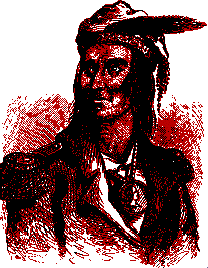
Sell a country! Why not sell the air, the clouds, and the Great Sea, as well as the earth? Did not the Great Good Spirit make them all for the use of his children?
Tecumseh (Shawnee), speech to William Harrison, Governor of the Indiana Territory, August 11, 1810
Every Indian village in the old days had its granaries of corn, its stores of dried beans, berries, and pumpkin-strips, as well as its dried buffalo tongues, pemmican and deer's meat. To this day all the Fisher Indians of the north and west dry great quantities of fish, as well as berries, for the famine months that are surely coming.
Many of the modern Indians, armed with rifles, have learned to emulate the white man, and slaughter game for the love of slaughter, without reference to the future. Such waste was condemned by the old-time Indians, as an abuse of the gifts of God, and which would surely bring its punishment.
When, in 1684, De la Barre, Governor of Canada, complained that the Iroquois were encroaching on the country of those Indians who were allies of the French, he got a stinging reply from Garangula, the Onondaga Chief, and a general statement showing that the aborigines had game laws, not written, indeed, but well known, and enforced at the spear-point, if need be:
We knock the Twightwies [Miamis] and Chictaghicks [Illinois] on the head, because they had cut down the trees of peace, which were the limits of our country. They have hunted beaver on our lands. They have acted contrary to the customs of all Indians, for they left none of the beavers alive, they killed both male and female. (Sam G. Drake's Indian Biog. 1832, p. III.)
Hunter says of the Kansas Indians:
I have never known a solitary instance of their wantonly destroying any of those animals [buffalo, elk, and deer], except on the hunting-grounds of their enemies, or encouraged to it by the prospect of bartering their skins with the traders. (Hunter's Captivity, 1798-1816, p. 279.)
After all, the Wild Indians could not be justly termed improvident, when the manner of life is taken into consideration. They let nothing go to waste, and labored incessantly during the summer and fall, to lay up provisions for the inclement season. (Indian Boyhood, Eastman; pp. 237-8.)
Ernest Thompson Seton, "Chapter II: The Spartans of the West," The Book of Woodcraft, 1912

Every part of this country is sacred to my people. Every hill-side, every valley, every plain and grove has been hallowed by some fond memory or some sad experience of my tribe.
Even the rocks that seem to lie dumb as they swelter in the sun along the silent seashore in solemn grandeur thrill with memories of past events connected with the fate of my people, and the very dust under your feet responds more lovingly to our footsteps than to yours, because it is the ashes of our ancestors, and our bare feet are conscious of the sympathetic touch, for the soil is rich with the life of our kindred.
Chief Seattle (Suquamish), from a speech, 1854
A long time ago this land belonged to our fathers; but when I go up to the river I see camps of soldiers on its banks. These soldiers cut down my timber; they kill my buffalo; and when I see that, my heart feels like bursting; I feel sorry....Has the white man become a child that he should recklessly kill and not eat? When the red men slay game, they do so that they may live and not starve.
Satanta (Kiowa), quoted in New York Times, October 26, 1867
Of the 3,700,000 buffalo destroyed from 1872 through 1874, only 150,000 were killed by Indians. When a group of concerned Texans asked General (Philip) Sheridan if something should not be done to stop the white hunters' wholesale slaughter, he replied: "Let them kill, skin and sell until the buffalo is exterminated, as it is the only way to bring lasting peace and allow civilization to advance."
Dee Brown, Bury My Heart at Wounded Knee
We love them [the buffalo] just as the white man does his money. Just as it makes a white man feel to have his money carried away, so it makes us feel to see others killing and stealing our buffaloes, which are our cattle given to us by the Great Father above to provide us meat to eat and means to get things to wear.
Bull Bear (Cheyenne), quoted in The Buffalo War: The History of the Red River Indian Uprising of 1874
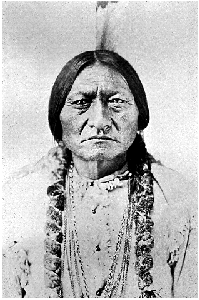
Our land is more valuable than your money. It will last forever. As long as the sun shines and the waters flow, this land will be here to give life to men and animals. We cannot sell the lives of men and animals; therefore, we cannot sell this land. It was put here for us by the Great Spirit and we cannot sell it because it does not belong to us.
Sitting Bull (Hunkpapa Lakota), answer to US delegates who wanted him to sign a treaty, c. 1876
Behold, my friends, the spring is come; the earth has gladly received the embraces of the sun, and we shall soon see the results of their love! Every seed is awakened, and all animal life. It is through this mysterious power that we too have our being, and we therefore yield to our neighbors, even to our animal neighbors, the same right as ourselves to inhabit this vast land.
Yet hear me, friends! we have now to deal with another people, small and feeble when our forefathers first met with them, but now great and overbearing. Strangely enough, they have a mind to till the soil, and the love of possessions is a disease in them. These people have made many rules that the rich may break, but the poor may not! They have a religion in which the poor worship, but the rich will not! They even take tithes of the poor and weak to support the rich and those who rule. They claim this mother of ours, the Earth, for their own use, and fence their neighbors away from her, and deface her with their buildings and their refuse. They compel her to produce out of season, and when sterile she is made to take medicine in order to produce again. All this is sacrilege.
This nation is like a spring freshet; it overruns its banks and destroys all who are in its path. We cannot dwell side by side. Only seven years ago we made a treaty by which we were assured that the buffalo country should be left to us forever. Now they threaten to take that from us also. My brothers, shall we submit? or shall we say to them: "First kill me, before you can take possession of my fatherland!"
Sitting Bull (Hunkpapa Lakota), quoted in Indian Heroes and Great Chieftains, Charles A. Eastman, 1918
...I belong to the earth out of which I came. The earth is my mother.
You white people get together, measure the earth, and then divide it....Part of the Indians gave up their land. I never did. The earth is part of my body, and I never gave up the earth.
Toohoolhoolzote (Wallowa), prophet, 1877
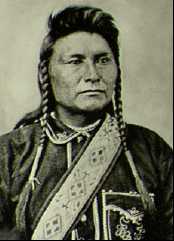
The earth was created by the assistance of the sun, and it should be left as it was....The country was made without lines of demarcation, and it is no man's business to divide it....The earth and myself are of one mind. The measure of the land and the measure of our bodies are the same....Do not misunderstand me, but understand me fully with reference to my affection for the land. I never said the land was mine to do with as I chose. The one who has the right to dispose of it is the one who created it. I claim a right to live on my land and accord you the privilege to live on yours.
Chief Joseph (Nez Perce), 1879
You ask me to plow the ground. Shall I take a knife and tear my mother's breast? Then when I die she will not take me to her bosom to be born again.
Smohalla (Wanapum), from a speech, late 19th century
The Great Spirit is in all things, he is in the air we breathe. The Great Spirit is our father, but the earth is our mother. She nourishes us, that which we put into the ground she returns to us, and healing plants she gives us likewise. If we are wounded, we go to our mother and seek to lay the wounded part against her, to be healed.
Big Thunder (Wabanaki), late 19th century, quoted in The Indian's Book by Natalie Curtis
From Wakan-Tanka, the Great Mystery, comes all power. It is from Wakan-Tanka that the holy man has wisdom and the power to heal and make holy charms. Man knows that all healing plants are given by Wakan-Tanka, therefore they are holy. So too is the buffalo holy, because it is the gift of Wakan-Tanka.
Flat-Iron (Oglala Sioux), late 19th century
The Á-shi-wi, or Zuñis, suppose the sun, moon, and stars, the sky, earth, and sea, in all their phenomena and elements; and all inanimate objects, as well as plants, animals, and men, to belong to one great system of all-conscious and interrelated life....
Frank Cushing, Zuñi Fetiches, Second Annual Report of the Bureau of American Ethnology, 1880-1881 (Washington, D.C., 1883)
The landscape is our church, a cathedral. It is like a sacred building to us.
Zuni saying, quoted in Through Indian Eyes
The work of the white man hardens soul and body. Nor is it right to tear up and mutilate the earth as white men do…. We simply take the gifts that are freely offered. We no more harm the earth than would an infant's fingers harm its mother's breast.
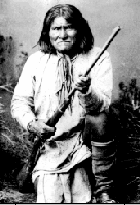
Unknown Indian, quoted in "The Ghost-Dance Religion and the Sioux Outbreak of 1890," 1896
The Chiricahua, indeed all the Apache, had the priceless inheritance of those who live so close to the natural world that they cannot ever forget that they are a part of it and it is a part of them.
.
.
.
To the Indian mind, a man's attachment to his homeland was not a romantic nostrum but a vital necessity. A man sickened and eventually died—a whole people might die away—if cut off from the life-source of the land itself. And so Geronimo, that "bloodthirsty savage," ends has autobiography with a plea that has the unmistakable dignity of profound conviction: he asks the Great Father, Theodore Roosevelt, to return him and his people to their Arizona homeland.
Frederick Turner, Introduction to Geronimo, His Own Story, 1906
All things are the works of the Great Spirit. We should know that He is within all things: the trees, the grasses, the rivers, the mountains, and all the four legged-animals, and the winged peoples; and even more important, we should understand that He is also above all these things and peoples.
Black Elk (Oglala Sioux)
The Indian loved to worship. From birth to death he revered his surroundings. He considered himself born in the luxurious lap of Mother Earth and no place to him was humble.
Luther Standing Bear (Oglala Sioux), 1868-1937
We do not like to harm trees. Whenever we can, we always make an offering of tobacco to the trees before we cut them down. We never waste the wood, but use all that we cut down. If we did not think of their feelings, all the other trees in the forest would weep, and that would make our hearts sad, too.
Unknown Fox Indian, quoted in Ethnography of the Fox Indians, 1939
More quotes on cultural values
Native and Euro-American beliefs differ
Our self-righteous superiority complex
Longstanding love and respect
Krech suggests the Indians' love of nature is a recent belief adopted to make them look holier-than-thou. He writes: "Since 1970, Indians themselves have set expectations for their behavior consistent with, and helping to reinforce, the image of the Ecological Indian thriving in public culture. Many write of Indians as ecologists and conservationists who have never wasted and have always led harmonious lives in balance with nature."
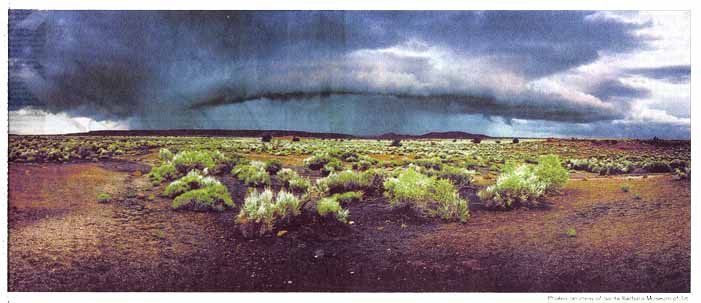
But as these quotes show, respect for the natural world goes back almost as long as people have been recording Indian thought. Non-Indians such as Turner and Cushing also recognized the difference between Native and European values.
Note that Indians don't deny using nature's gifts. Obviously they killed, ate, and used plants and animals for food, shelter, and tools. They cleared brush with fire, farmed the land, and built canals, mounds, and towns. The question is whether they did so carefully and thoughtfully or foolishly and wastefully.
Likewise, today's environmentalists don't oppose using land for crops, timber for building, or oil for energy. What they oppose is using these resources up. In other words, using them wantonly until they're gone, and polluting the air and water while doing so. This is the same or similar attitude to that of traditional Native people.
In contrast to the biblical book of Genesis, in which God creates man in his own image and gives him dominion over all other creatures, the Native American legends reflect the view that human beings are no more important than any other thing, whether alive or inanimate. In the eye of the Creator, they believe, man and woman, plant and animal, water and stone, are all equal, and they share the earth as partners—even as family.
The Spirit World (American Indians), Time-Life Books
The earth is our mother. We believe that. I've met indigenous people from around the world and I've yet to find a difference of opinion on that. It's much more than a saying, it's much more than a word, it's a real compassion and a longevity.
Chief Oren Lyons (Onondaga), quoted in Surviving in Two Worlds
The only thing that holds us together is our religion, but I wonder if it will last. It's not just a religion, like the Catholic religion. God doesn't mean fear. He means the Creator, the One Above. The mountains over there. The sky above. It's Mother Earth. The stories we learned as children were about God meaning love and God meaning beauty, just as it is in nature everywhere around you. There is no church because all is a church to us here.
Tony Frank Martinez, quoted in Taos Pueblo, 1986
We believe that all living things come from our sacred mother earth, all living things, the green things, the winged things of the air, the four-leggeds, the things that crawl and the two-leggeds....But the important thing in our philosophy is that we believe we're the weakest things on earth, that the two-legged is the weakest thing on earth because we have no direction....Now, because we are the weakest things on earth, we do not have license to exploit or manipulate our brother and sisters and we also know, because of our role in life, that the buffalo and all other relatives of ours teach us, and so we built our civilization.
Dennis Banks (Chippewa), Wounded Knee testimony, 2/12/74
I will start by repeating the words of Associate Chief Judge Murray Sinclair of the Provincial Court of Manitoba, himself Ojibway, in an address he gave to a conference on Aboriginal justice in Saskatoon in 1993:

I am not a biblical scholar, but as I have come to understand it, in Judaeo-Christian tradition, man occupies a position just below God and the angels, but above all other early creation ... According to the Genesis account of creation ... "God said "Let us make man in our image and likeness to rule the fish in the sea, the birds of heaven, the cattle, all wild animals on earth, and all reptiles that crawl upon the earth..." Mankind was told to: "... fill the earth and subdue it, rule over the fish in the sea, the birds of heaven, and every living thing that moves upon the earth." In sharp contrast, the Aboriginal world-view holds that mankind is the least powerful and least important factor in creation ... Mankind's interests are not to be placed above those of any other part of creation. In the matter of the hierarchy, or relative importance of beings within creation, Aboriginal and Western intellectual traditions are almost diametrically opposed. It goes without saying that our world-view provides the basis for those customs, thoughts and behaviours we consider appropriate." (emphasis added)
Within the Ojibway world-view, then, the hierarchy of creation placed the earth (and its life-blood, the waters) in first place, for without them there would be no plants, animals or human life. The plant world stood second, for without it there would be no animal or human life. The animal world was third. Last, and least important of all, was mankind, for nothing whatever depended on our survival. We were also clearly the most dependent, and therefore owed the greatest duty of respect and care for the other three. Our central duty was not to subdue them, but to learn how they interacted, or connected, so that we could accommodate ourselves to those existing relationships. Any other approach, in the long run, could only result in a disruption of the healthy equilibria which had existed for millennia and which, in fact, created the conditions for our own evolution.
Rupert Ross, Red Jacket and the Right to Rule, 1994
[A non-Indian] said that he was really sorry about what had happened to Indians, but that there was good reason for it. The continent had to be developed and he felt that Indians had stood in the way and thus had had to be removed. "After all," he remarked, "what did you do to the land when you had it?" I didn't understand him until later when I discovered that the Cuyahoga River running through Cleveland is inflammable....How many Indians could have thought of creating an inflammable river?
Vine Deloria Jr. (Standing Rock Sioux), We Talk, You Listen; New Tribes, New Turf
Brothers and Sisters do not be fooled by the wiles of the trickster. This entire argument is a family fight between the Three Cousins—Judaism, Islam, and Christianity. All three of them are so off their sacred, ancient path that they fail to recognize or be recognized by Nature herself. They forgot how to be related and mimic the ways of Eya and Iktomi. They bask in their dominance of Nature and revile as less than, those of us who still hold on to our traditional matriarchal ways.
They speak out of both sides of their mouth and still find time to consume natural resources at a disproportionate rate. Truly they are Eya, the great consumer. Grandmother Earth will not continue to allow the Three Cousins to run amuck. Nature has her own ways of ebb and flow.
James Starkey, The World According to the Three Cousins, 9/9/02
"We have always interacted intensively with our environment," said Ross Soboleff, a member of the Haida and Tlingit nations in Juneau, Alaska. "We've never put it on a pedestal and worshipped it."
Lester, director of the tribal energy group, said conflicts between Indians and environmental groups are born of differing cultural views.
"In the Indian world view, the cosmos is not divided between light and darkness. For the environmental movement, it is. A tribe can be very ecologically minded and very development-minded at the same time," he said.
Environment, Inc.: Drilling Debate Jolts Old Image of Indians, Sacramento Bee, 12/9/01
"We must renew and redouble our efforts to wage peace," she said, adding that Americans also need to open their eyes to the social and environmental impacts they cause by being the largest consumers of natural resources in the world.
"We are pretty much pigs," [activist Winona] LaDuke later told participants at a private fund-raiser. "It means we live in a continuing reality of wanting something that someone else has."
LaDuke, a member of the Mississippi Band of Anishinabeg, said Native Americans, with their historical ties to the land, must be leaders in the fight to regain a consciousness of caring for the environment. If the natural world is not healed and protected, we will pay.
"We have a predator-prey relationship with our land, and the land is the prey" LaDuke said. "Those issues will plague us in this society as ever-open sores."
From Parallels Drawn Between Child Rearing and Political Activism, Indian Country Today, 10/4/01
More Native quotes on nature
North American Indians: the spirituality of nature
More evidence for Natives as ecologists
Traditional Navajos were "green"
Cherokees as eco-warriors
Indians know climate change
Yellowstone a study in vital role of wildfires
Nature = wild and irrational
A brief history of Western civilization's attitude toward nature:
Wilderness and Preservation
And in future what a splendid contemplation... when one... imagines them as they might be seen, by some great protecting policy of government preserved in their pristine beauty and wildness, in a magnificent park, where the world could see for ages to come, the native Indian in his classic attire, galloping his wild horse, with sinewy bow, and shield and lance, amid the fleeting herds of elks and buffaloes... A nation's Park, containing man and beast, in all the wild and freshness of their nature's beauty!
George Catlin, 1841, The Manners and Customs of the North American Indians 1
The idea that humankind, or to be more accurate mankind, is apart from nature seems to be one that is deeply rooted in western civilization. In contrast to the 'animistic' religions of many indigenous peoples, which, to use our terms, see culture in nature and nature in culture,2 Judaeo-Christian traditions tell of an origin in which man was given dominion over the beasts. Indeed, even the most ancient of the world's epics, the Tale of Gilgamesh, recounts the primordial struggle between kingly civilisation and the forests, the source of all evil and brutishness.3
In ancient Greece, untamed nature was perceived as the domain of wild, irrational, female forces that contrasted with the rational culture ordered by males. In this world view, not only was nature a dangerous threat to the city state, but the wilderness beyond was peopled by barbarians, the epitome of whom were the Amazons—long haired, naked, female savages who represented the antithesis of Greek civilization.
These precepts endure to this day. In Europe's middle ages the image was sustained of an ordered world of culture managed by civilised men, bounded by a chaotic wilderness peopled with savages, the abode of pagan warlocks and witches who drew their power from the dangerous, evil forces of nature, the realm of Beelzebub himself.4 Similar images continue to sustain the views of fundamentalist Christian missionaries who perceive the shamanism of indigenous peoples as 'devil worship', and believe that as 'Commandos for Christ' they have a God-given role to 'reach the lost until they have reached the last', in 'Satan's last stronghold'.5
Pioneering Christian fundamentalists brought these same views of nature to the New World where they found them strongly reinforced. Beset from the first by naked, long haired 'salvages'6 who knew nothing of Christ or modesty, their precarious frontier world depended on a taming of nature as they sought to wrest a living from a hostile 'wilderness'. As one local poet wrote in 1662, the forests of the New World were:
A waste and howling wilderness,
Where none inhabited
But hellish fiends and brutish men
That devils worshipped.7
The notion that their society had a 'manifest destiny' to tame the wilds became for them a fundamental truth and political imperative.8
Westerners vs. nature
Some quotes confirm the standard Euro-American view of nature: a dead, unproductive resource waiting to be put to use for the "betterment" of humanity.
In the evening the men in two of the rear canoes discovered a large brown bear lying in the open grounds about 300 paces from the river, and six of them went out to attack him, all good hunters....[One] shot him through the head and finally killed him.
I walked on shore and killed a female ibi or big horn animal.
I saw near those bluffs the most beautiful fox that I ever beheld. The colours appeared to me to be a fine orange yellow, white and black. I endeavored to kill this animal....
Lewis and Clark showing their appreciation of nature, May 1805, as quoted in The Essential Lewis and Clark
Ours is a shockingly dead view of creation. We ourselves are the only things in the universe to which we grant an authentic vitality, and because of this we are not fully alive.
Frederick Jackson Turner, historian, late 19th century, quoted in The American Indian and the Problem of History
In contrast to the Native views expressed above, the modern American view still echoes Turner's 19th-century view. Many people have noted this. For instance:
Human beings are the most dangerous animals. They've gotten so far from nature that they've lost their common sense. I have a fascination with modern man's lack of perspective. We have become enemies of nature.

Peter Beard, nature photographer, quoted in the LA Times, 2/4/01
Why has the leader of the free world opted out? The first reason lies deep in the national psyche. The old world developed on the basis of a coalition -- uneasy but understood -- between humanity and its surroundings. The settlement of the US was based on conquest, not just of the indigenous peoples, but also of the terrain. It appears to be, thus far, one of the great success stories of modern history.
"Remember, this country is built very heavily on the frontier ethic," says Clapp. "How America moved west was to exhaust the land and move on. The original settlers, such as the Jefferson family, moved westward because families like theirs planted tobacco in tidewater Virginia and exhausted the soil. My own ancestors did the same in Indiana."
Americans made crops grow in places that are entirely arid. They built dams -- about 250,000 of them. They built great cities, with skyscrapers and symphony orchestras, in places that appeared barely habitable. They shifted rivers, even reversed their flow. "It's the American belief that with enough hard work and perseverance anything -- be it a force of nature, a country or a disease -- can be vanquished," says Clapp. "It's a country founded on the idea of no limits. The essence of environmentalism is that there are indeed limits. It's one of the reasons environmentalism is a stronger ethic in Europe than in the US."
Matthew Engel, Road to Ruin: How America is Ravaging the Planet, The Guardian, 10/24/03
All things considered, it may be the central assumption of technological society that there is virtue in overpowering nature and native peoples. The Indian problem today, as it always has been, is directly related to the needs of technological societies to find and obtain remotely located resources, in order to fuel an incessant and intrinsic demand for growth and technological fulfillment. The process began in our country hundreds of years ago when we wanted land and gold. Today it continues because we want coal, oil, uranium, fish, and more land. As we survey the rest of the world — whether it is the Canadian Arctic, the Borneo jungle, or the Brazilian rainforest — the same interaction is taking place for the same reasons, often involving the same institutions.
Jerry Mander, In the Absence of the Sacred, 1991
[The emerging and provocative field of eco-psychology] diagnoses the mounting psychic stress, mental illness and social disorder plaguing affluent societies as the consequence of a dysfunctional, immature relationship with nature. They decipher the psycho-historical trajectory of Western civilization from hunter-gatherer clans to agricultural societies and the urban megalopolis as a profound loss of humility and tender sense of earthly limitations once invoked by a harmonious and reverent liaison with nature. Humanity has become disconnected and alienated from a non-human world fallen and debased. Man has become enraptured in a mania of domination and absolute control to worship a hydra of endless consumption and materialism.
John Wickham, Resistance to Makah Whale Hunt Exposes Modern Madness, Indian Country Today, 10/20/05
As a left biocentrist, I have advocated for quite some time, in various publications, the need to return to some form of animism. Like deep ecologists and left biocentrists, Rod Preece in his 1999 book Animals and Nature: Cultural Myths, Cultural Realities, sees the necessity for a spiritual transformation. The following quotation, which is on my wall for a daily reminder, reveals a deep ecology understanding, particularly the concept of self-realization, even though deep ecology, unfortunately, is not discussed in this book:
All cultures think of their own interests first and only a spiritual education dedicated to a sharing of identities with other peoples, other animals, and nature as a whole can diminish the environmental destruction we face. It can be diminished by our being educated to share our identity with the natural world and thus understand it as a part of ourselves. (p. 230)
David Orton, e-mail, 10/7/01
We are at the crucial moment in the commission of a crime. Our hand is on the knife, the knife is at the victim's throat. We are trained to kill. We are trained to turn the earth to account, to use it, market it, make money off it. To take it for granted. Logically, we will never be able to reverse this part of our culture in enough time to stop that knife in our hand. But that is the task at hand—to cease this act of violence. Everything we love, and everything we think we are, will be gone, will cease to be, unless we manage to change. We will either produce descendants who think a cactus, a rat, an insect, and a snake are as important as human beings, or we will not leave descendants. In the short run it pays to do as we have always done, lest we have less treasure with which to comfort ourselves in the dark and lonely nights. In the short run it might theoretically pay a hungry human being to eat its own liver, as one scientist has put it. But in a slightly longer run such a diet would be fatal.
...[W]e have made a career out of refusing to adapt. We say it is contrary to our custom. One glance at our towns and cities in the region makes this clear. They are all oases, space colonies implanted on what we seem to take to be the forbidding surface of Mars. Even when we try to fit in—with our gestures toward natural history, our science, our ecology, our environmental politics—we still seem to miss the point. The desert does not need us and in time, given our habits, will crush us and reject us. We do not plan for seven generations, we do not seem to give.
In the past we tended to remain silent while the ground that gives us life was murdered. Now we make studies of it before we kill it. Now we write stories protesting its death. And then we kill it, all of us, and share in the rewards of this act.
Charles Bowden, The Sonoran Desert
They paved paradise and put up a parking lot
With a pink hotel, a boutique and a swingin' hot spot
They took all the trees, put 'em in a tree museum
And they charged the people a dollar and a half just to see 'em
Joni Mitchell, "Big Yellow Taxi"
More on Westerners vs. nature
Bush to pollute Mesa Verde
Dancing to a different energy beat
Conventions pollute the air
Cahokia mound vs. garbage mound
Western view of nature
Bush hates environmentalists: No question, the climate is heating up
Conservation "pays biggest dividends"
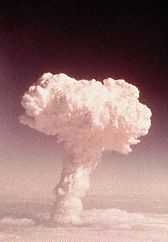
Little religious sacrifice
The following quote seems a telling point by itself:
Absent for the most part from the religions of the American Indians was the near universal practice of animal and human sacrifice to placate the gods. "North America had almost no sacrifice, even of animals. Mother Earth did not demand it."
Lewis M. Hoppe, Religions of the World, 1976 (quote from Ruth Underhill, Red Man's Religion, 1965)
But let's not stereotype Indians as perfect paragons. Here's one of the exceptions:
Near the scaffold I saw the carcase, of a large dog not yet decayed, which I supposed had been killed at the time the human body was left on the scaffold; this was no doubt the reward, which the poor dog had met with for performing the [blank space in manuscript] friendly office to his mistres of transporting her corps to the place of deposit. It is customary with the Assinniboins, Mandans, Minetares &c. who scaffold their dead, to sacrefice the favorite horses and doggs of their deceased relations, with a view of their being serviceable to them in the land of sperits.
Journal of Merriwether Lewis, April 20, 1805, quoted in The Essential Lewis and Clark
To sum up the valid points Krech makes and the valid points he misses, here's an excerpt from Defending Mother Earth: Native American Perspectives on Environmental Justice (Jace Weaver, editor). It offers a sounder conclusion than Krech's:
In reality, modern Natives and their ancestors are neither saints nor sinners in environmental matters. They are human beings. The Americas were no Edenic paradise. "People sometimes went hungry . . . ; wars were fought, and people died in them. Occasionally, a native civilization overtaxed its environment and collapsed." Grinde and Johansen state, "Occasionally, in pre-Columbian times, native urban areas taxed the local environment (e.g., by overgrazing and razing the forests). Like all societies, those in pre-Columbian America faced the question of how to utilize land for purposes of survival. Indians manipulated the environment to improve their material lives." The general consensus today, however, is that, given pre-contact population numbers, Native peoples could have wrought much more environmental damage than was the case. Again according to Grinde and Johansen, "While mistakes were made, the fact that Europeans found the Western Hemisphere to be a natural treasure house indicates that misuse of the environment was not frequent or sustained over long periods of time."
More on Indians' ecological beliefs
Art challenges Desert Rock
Response to Medved's column
Indians know global warming
Rainmakers vs. Georgia drought
Racist plan to reduce emissions
Polar bears wanted dead, not alive
"Red is Green"
Litefoot's Native Green Energy
Tribes trading carbon credits
Global warming is racist
Please forgive us, Earth
Indians for the environment
Seven-generation thinking
Conservation = Native value
Natives win "Nobel Prize for environmentalists"
Review of American Indians and National Parks
Related links
Another eco-book bashes Indians
Dennis Prager and The Ecological Indian
The "inexcusable" Hopi smothering of eaglets
The Makah whale-hunt controversy
Technology vs. Native values
* More opinions *
|
|
. . .
|

|
Home |
Contents |
Photos |
News |
Reviews |
Store |
Forum |
ICI |
Educators |
Fans |
Contests |
Help |
FAQ |
Info
All material © copyright its original owners, except where noted.
Original text and pictures © copyright 2007 by Robert Schmidt.
Copyrighted material is posted under the Fair Use provision of the Copyright Act,
which allows copying for nonprofit educational uses including criticism and commentary.
Comments sent to the publisher become the property of Blue Corn Comics
and may be used in other postings without permission.











